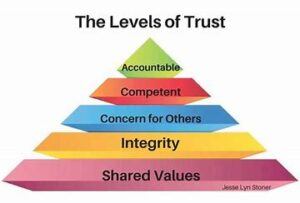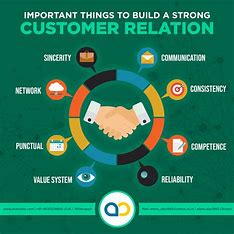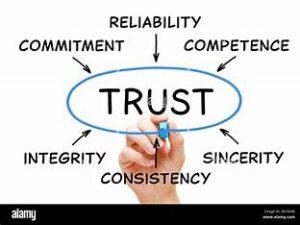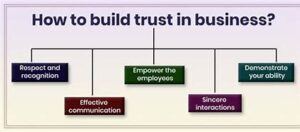Trust is like the secret sauce in the recipe for business success. It’s what keeps all the ingredients together, ensuring everything tastes just right. Without it, you’re just left with a mix of disconnected pieces that don’t quite gel. But what exactly makes trust so crucial in the world of business? Let’s dig into it.

At its core, trust in business isn’t just about being honest or keeping promises, though those are definitely big parts of it. It’s more about creating a sense of safety and confidence amongst employees, partners, and customers. When trust is present, people feel secure to take risks, to innovate, and to collaborate effectively without the fear of being undermined or let down.
click here to start your own online business for free Ced0224
Looking back through history, you’ll notice that trust has always been a vital part of successful business relationships. From handshake deals of small-town merchants to today’s complex global supply chains, trust has been the glue holding everything together. Businesses that have built their reputations on trust tend to stand the test of time, while those lacking it often end up crumbling under the weight of distrust and constant oversight.
What makes for a trustworthy business relationship anyway? It generally boils down to three big things: integrity, sincerity, and reliability. Integrity is about sticking to your values and doing the right thing, even when nobody’s looking. Sincerity is about open, honest communication. And reliability? It’s all about consistency—doing what you say you’re going to do, time and time again.
Look at companies like Patagonia, which has built trust by sticking to their environmental values and being transparent with their customers. Their integrity and sincerity have earned them a dedicated customer base. Another big player, Toyota, nailed the reliability piece, consistently delivering quality products and quickly addressing any issues, reinforcing consumer trust.
The businesses built on trust aren’t just surviving; they’re thriving. In this fast-paced world, where things change in the blink of an eye, having that solid trust foundation gives a huge competitive advantage. It’s not just an abstract concept, but a powerful force that can propel companies to new heights.
Trust as a Catalyst for Collaboration and Innovation
Trust isn’t just a nice-to-have in business; it’s a must for making things happen. When people trust each other, magic can happen because they feel safe to share ideas, challenge each other, and work together without fear of backstabbing or judgment. This level of comfort is essential when trying to foster collaboration and bring innovative ideas to life.

In teams where trust is a core value, communication flows more freely, and everyone is more likely to contribute openly and honestly. Team members aren’t afraid to think outside the box or push boundaries, leading to innovative solutions and approaches. Without trust, though, you might find people holding back or sticking to safe, familiar paths, stifling creativity.
Companies that have managed to weave trust into their fabric often see groundbreaking results. Take Google, for instance. Their emphasis on a “psychological safety” environment, where employees feel secure enough to express themselves and take risks, has led to countless innovative projects. It’s no coincidence that they consistently lead in tech innovation.
A trust-based culture doesn’t just boost creativity in the short term. It paves the way for long-term success. Teams that trust each other build on their successes over time, becoming more agile and adept at navigating challenges. They’re not bogged down by finger-pointing or miscommunications, which often derail projects in less trusting environments.
Creating this kind of atmosphere starts with leadership. Leaders who prioritize trust by being transparent, admitting mistakes, and encouraging open dialogue set the tone for the entire organization. They empower everyone in the company to take ownership of their roles and contribute their best ideas without fear of repercussions. Leaders also benefit from regular feedback from their teams, helping them refine their strategies and tactics continuously.
Encouraging a culture of trust and innovation isn’t simply about making the work environment more pleasant. It directly influences a company’s bottom line by driving new solutions, improving efficiency, and ultimately giving the company a competitive edge. It’s like putting the entire organization on a fast track to growth.
Trust and Customer Relationships – Building Brand Loyalty
Trust between a business and its customers is the heart of brand loyalty. When customers know they can rely on a brand to deliver quality and keep their promises, they come back time and again. It’s about creating a comfortable space where they’re happy to invest their time and money, confident that they’ll get value in return.

Think about it: a brand that consistently delivers on its promises earns a customer’s loyalty. Loyal customers aren’t just repeat buyers; they’re also enthusiastic brand ambassadors who spread the good word. They’ve seen, felt, and experienced the trustworthiness of a brand firsthand. It’s like having a devoted fan base that champions your brand, even outside the usual marketing channels.
One of the key pillars of trust in customer relationships is transparency. Honest communication builds trust, so businesses should aim to be as clear and upfront as possible, especially when things might not be going to plan. Whether it’s a shipping delay or a product recall, informing customers promptly and genuinely goes a long way in solidifying trust.
Successful companies also engage customers by offering platforms for feedback and actually acting on it. When customers feel heard and see their input making a difference, their trust deepens. This doesn’t just lead to improved customer satisfaction but turns satisfied customers into loyal ones.
Measuring trust can be tricky, but certain metrics like Net Promoter Score (NPS) can provide insight. High NPS scores often indicate strong trust between customers and the brand. It’s a tangible way to evaluate how well you’re meeting customer expectations and fostering loyalty.
Making trust a core part of customer relationships sets the foundation for enduring brand loyalty. It’s not just about making one-time sales; it’s about building long-lasting connections that benefit both the business and its customers.
Addressing Distrust – Overcoming Challenges in Business Relationships
Distrust can be a business killer, sapping energy and wasting resources on damage control instead of growth. It’s like a bad vibe that needs fixing fast before it spirals into something way bigger. But how do you even begin to tackle this tricky issue? It’s all about recognizing the signs and knowing how to respond effectively.

One of the first signs of distrust is a breakdown in communication. Maybe people stop sharing information, or conversations become guarded and defensive. Another common flag is declining productivity, as the focus shifts from collaboration to self-protection. Addressing these early indicators can prevent further damage, so stay alert.
Restoring trust isn’t about quick-fixes or superficial gestures. It’s about addressing the root causes and being transparent with all stakeholders involved. When trust breaks down, open and honest conversations are your best friend. Acknowledge the mistakes, take responsibility, and outline clear steps to move forward. It shows that you’re not just paying lip service but genuinely committed to making things right.
Another strategy is to rebuild trust with actions, not just words. Consistency is key here. Regularly deliver on promises to rebuild credibility and demonstrate reliability. This isn’t a one-time effort but an ongoing commitment to reconstruction.
Take inspiration from leaders who have seen trust evaporate overnight and worked hard to gain it back. Remember Equifax after their data breach? They didn’t just apologize. They implemented enhanced security measures and kept the public informed to rebuild trust with their consumers. It wasn’t easy, but persistent efforts helped to regain confidence over time.
Communication remains critical during this trust-rebuilding phase. Keeping lines open, welcoming feedback, and showing willingness to change can turn a new leaf in frayed relationships. Those who manage this well can often create stronger, more resilient partnerships ready to tackle future challenges together.
Digital Trust – Navigating the Online Business Landscape
Navigating the digital landscape involves a unique set of challenges when it comes to trust. With the rise of online interactions, businesses need to rethink how they build and maintain trust in environments where face-to-face communication is limited, and privacy concerns are rampant.

In a world where data breaches often make headlines, securing data privacy has become a top priority for building digital trust. Customers want to know their information is safe and only being used in ways they’ve agreed to. Hence, businesses need robust security practices to protect this trust.
Implementing clear privacy policies and communicating them effectively to your customers plays a major role in gaining their trust online. When people are aware of how their data is being handled, it adds an extra layer of confidence in digital transactions. Keeping these policies updated and transparent shows your commitment to safeguarding your customers’ information.
Managing your online reputation is also vital to maintaining trust in the digital sphere. Tools like social media monitoring and reviews can offer insights into customer perceptions. Responding quickly and effectively to concerns or praises on these platforms can further establish trust. Engage with both positive and negative feedback to show you’re attentive and accountable.
The future of digital trust involves cutting-edge technologies like blockchain and AI, providing new avenues for secure, transparent interactions. Businesses can leverage these technologies to build trust by offering tamper-proof transactions and automated, reliable services.
Navigating these digital trust waters requires vigilance and a proactive approach, but businesses that commit to these principles will find themselves ahead of the curve. By fostering a secure and transparent online environment, they’ll nurture trust among a tech-savvy and privacy-conscious audience.
The Way Forward – Embedding Trust in Business Strategies
Trust should never be an afterthought in business; it’s got to be embedded right into the core of your strategy. Building a culture of trust requires a relentless commitment from everyone in the organization, starting from the top.

Embedding trust in your company’s strategies starts with leaders who lead by example. They are the ones who set the tone, showing what it means to be trustworthy and accountable. When leaders walk the walk, it encourages everyone else in the organization to follow suit and reinforces the values of sincerity and reliability throughout the company.
Measuring trust might sound tricky, but it can become a part of how you evaluate business performance. Include trust metrics in your evaluations to track progress and ensure that trust remains a key performance indicator alongside sales targets or customer satisfaction ratings. This shows that you value trust as much as your bottom line.
Training and development are another cornerstone of embedding trust into your business DNA. Offering training sessions that focus on ethical decision-making, effective communication, and management of customer data confidentiality can reinforce the importance of trust. Employees equipped with these skills are more likely to contribute positively to the workplace atmosphere and customer interactions, fueling long-term success.
Trust is not just a buzzword but a dynamic, transformative force in business. By consciously incorporating trust-building measures into everyday operations, businesses can’t just survive – they can thrive in today’s complex environments. Emphasizing trust unleashes a wealth of opportunities for growth and innovation, paving the way for a brighter and more sustainable business future.
